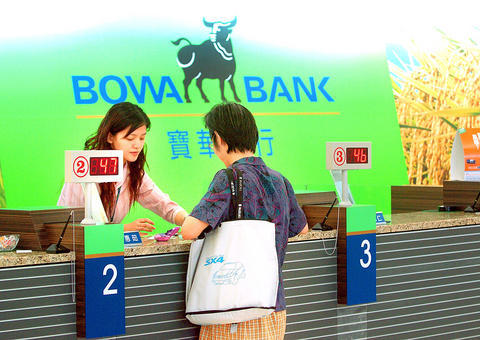Operations at all 39 branches of Bowa Bank (寶華銀行) were stable yesterday on the first business day after the bank was taken over by the state-run Central Deposit Insurance Corp (CDIC, 中央存保), a banking official said.
"We prepared NT$10 billion [US$303.35 million] in case of a bank run, which did not happen," a Land Bank of Taiwan (土地銀行) official said on condition of anonymity. "We saw more reporters than customers."
The Financial Supervisory Commission ordered the CDIC last Friday to take control of Bowa Bank after Bowa failed to execute a recapitalization plan to meet the minimum required regulatory capital. CDIC took control on Sunday afternoon.

PHOTO: FANG PIN-CHAO, TAIPEI TIMES
The CDIC, in turn, commissioned the Land Bank to run Bowa Bank during the transitional period.
The Land Bank official said yesterday's calm operations were due to the government's efforts to protect depositors' money when other banks have been taken over so that there would not be a repeat of the run on The Chinese Bank (中華銀行).
In the past year the government has also taken over China United Trust and Investment Corp (
Depositors at The Chinese Bank, owned by the financially troubled Rebar Asia Pacific Group (力霸亞太企業集團), withdrew more than NT$43.08 billion in five days after it was taken over.
As Bowa Bank was listed as a financially troubled bank in January, some customers had cleared their accounts at the time, the Land Bank official said. He refused to say how much had been withdrawn since the takeover announcement.
Taiwan Ratings Corp (
The agency also lowered its "twB-" subordinated bond issue rating to "twC," reflecting the bank's increased vulnerability to nonpayment, Taiwan Ratings said in a statement. Bowa's weak assets and marginal core earnings ability turned its reported net worth to negative NT$2.254 billion at the end of June from a positive NT$419 million at the end of March, the statement said.
Declining depositor confidence will hurt Bowa Bank's funding, the ratings agency said, adding that the bank's deposit balance shrunk by 22 percent in the first six months of the year.
Even though the Land Bank had put some inter-bank deposits into Bowa, part of its subordinated debentures with outstanding value of NT$1.047 billion that were issued after July 2005 -- representing an estimated 0.7 percent of total liabilities -- are not under regulatory protection, and could face the risk of non-payment in coming months, Taiwan Ratings said.
"The future credit profile of Bowa will depend on the result of an auction likely to be held by the regulator [the Financial Supervisory Commission] to sell off the bank," the ratings agency said.

Quanta Computer Inc (廣達) chairman Barry Lam (林百里) is expected to share his views about the artificial intelligence (AI) industry’s prospects during his speech at the company’s 37th anniversary ceremony, as AI servers have become a new growth engine for the equipment manufacturing service provider. Lam’s speech is much anticipated, as Quanta has risen as one of the world’s major AI server suppliers. The company reported a 30 percent year-on-year growth in consolidated revenue to NT$1.41 trillion (US$43.35 billion) last year, thanks to fast-growing demand for servers, especially those with AI capabilities. The company told investors in November last year that

Intel Corp has named Tasha Chuang (莊蓓瑜) to lead Intel Taiwan in a bid to reinforce relations between the company and its Taiwanese partners. The appointment of Chuang as general manager for Intel Taiwan takes effect on Thursday, the firm said in a statement yesterday. Chuang is to lead her team in Taiwan to pursue product development and sales growth in an effort to reinforce the company’s ties with its partners and clients, Intel said. Chuang was previously in charge of managing Intel’s ties with leading Taiwanese PC brand Asustek Computer Inc (華碩), which included helping Asustek strengthen its global businesses, the company

Taiwanese suppliers to Taiwan Semiconductor Manufacturing Co. (TSMC, 台積電) are expected to follow the contract chipmaker’s step to invest in the US, but their relocation may be seven to eight years away, Minister of Economic Affairs J.W. Kuo (郭智輝) said yesterday. When asked by opposition Chinese Nationalist Party (KMT) Legislator Niu Hsu-ting (牛煦庭) in the legislature about growing concerns that TSMC’s huge investments in the US will prompt its suppliers to follow suit, Kuo said based on the chipmaker’s current limited production volume, it is unlikely to lead its supply chain to go there for now. “Unless TSMC completes its planned six

TikTok abounds with viral videos accusing prestigious brands of secretly manufacturing luxury goods in China so they can be sold at cut prices. However, while these “revelations” are spurious, behind them lurks a well-oiled machine for selling counterfeit goods that is making the most of the confusion surrounding trade tariffs. Chinese content creators who portray themselves as workers or subcontractors in the luxury goods business claim that Beijing has lifted confidentiality clauses on local subcontractors as a way to respond to the huge hike in customs duties imposed on China by US President Donald Trump. They say this Chinese decision, of which Agence